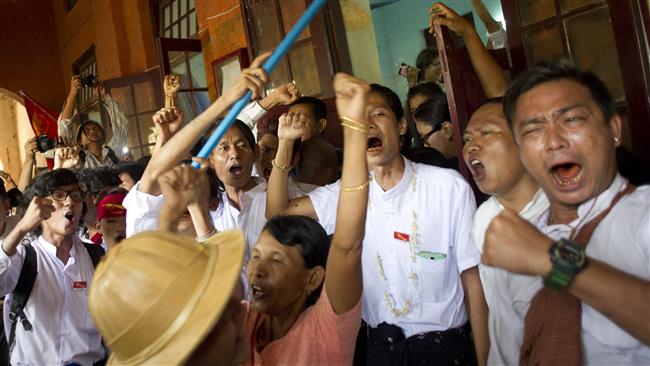Among those still in prison are two interfaith activists who were sentenced Friday by a Mandalay court to two additional years in prison with hard labor under the Unlawful Associations Act.
JAKARTA — Parliamentarians from across Southeast Asia welcomed the release of over 100 political prisoners in Myanmar, expressing their hope that the long-awaited move represents a sign of the new government’s commitment to addressing the country’s human rights challenges.
“It’s refreshing to see this new government act so quickly and decisively to free prisoners of conscience. It marks a very positive step and a clear sign of good faith,” said APHR Chairperson and Malaysian MP Charles Santiago. “We hope that the decision will be followed soon by an effort to free more political prisoners and reform the current repressive legal framework.”
On Friday, 8 April, at least 113 political prisoners were freed, following an announcement by State Counselor Aung San Suu Kyi of the government’s intention to work toward the release of those convicted and awaiting trial. The list includes dozens of student activists, who had been held at Tharrawaddy Prison in Bago Region since March 2015, awaiting trial in relation to their protest march in opposition to a national education bill.
While applauding the release of these individuals, APHR cautioned that prisoners of conscience still remain behind bars in Myanmar.
“There is still more work to be done. Many political prisoners continue to await their freedom,” said APHR Vice Chair Son Chhay, a member of the National Assembly in Cambodia. “It is promising to hear that more may be freed in the coming days. We eagerly await news of further releases and look forward to the day when no prisoners of conscience remain in Myanmar.”
The new Myanmar government should also take steps to repeal and amend laws that enable authorities to arrest and detain political prisoners, APHR said, pointing to a need for regional and international support to address decades of neglect in the judicial system. Parliamentarians expressed optimism at the recent recommendation by the Myanmar Parliament’s Legal Affairs and Special Cases Assessment Commission to amend or repeal statutes that have been used to arrest activists and human rights defenders, including Article 505(b) of the Penal Code and Article 18 of the Peaceful Assembly Law.
“We hope that the release of political prisoners is supplemented by an overhaul of repressive laws, which have been used for years to stifle dissent and imprison those voicing legitimate grievances,” Son Chhay said. “We are heartened to hear that legislative reform is on the agenda. The system won’t be fixed until the legal framework is updated.”
Parliamentarians also stressed the need to reform the security sector and called for international support to the new government to facilitate such efforts.
“Sustainable improvements to the legal framework also require reform measures to be taken by security forces, including the military and police. These institutions need to integrate respect for human rights into their functions and operating procedures,” said APHR Vice Chair and Indonesian MP Eva Kusuma Sundari.
“Without such changes, improvements to the content of laws will not bring about the fulfillment of human rights for the people of Myanmar. We have learned this lesson over time in Indonesia.”
Among those still in prison are two interfaith activists who were sentenced Friday by a Mandalay court to two additional years in prison with hard labor under the Unlawful Associations Act.
“The continued imprisonment of these interfaith activists reveals the dark underbelly of otherwise positive changes in Myanmar. The country has been increasingly plagued by the scourge of religious discrimination, which will remain a long-term challenge to the success of reforms,” Charles Santiago said.
“The rising tide of religious intolerance is a problem that affects our entire region, and we must work together to combat it in all its forms,” he added.
Source : www.aseanmp.org


